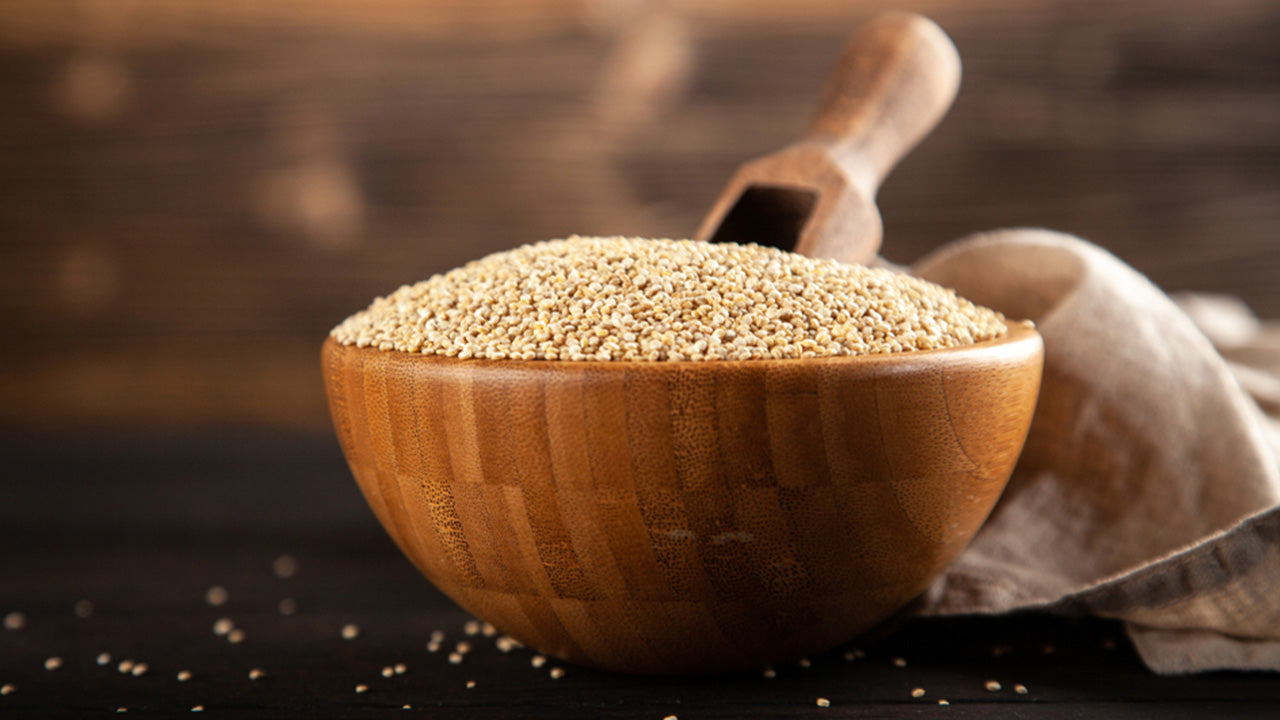The Osteoarthritis Diet: Best Foods and Supplements for Osteoarthritis
 By: by Amino Science
By: by Amino Science

When nothing else works, change your diet. It’s true for lots of chronic illnesses, but maybe arthritis isn’t one you think can be improved simply by changing your diet. Research tells us otherwise. In fact, there’s even a however controversial “osteoarthritis diet.” Several of them, actually, depending on where you look.
In one clinical trial, for example, a Cretan Mediterranean diet showed a “significant improvement in pain” over 12 weeks among patients with rheumatoid arthritis. The research, published in BMC Nutrition Journal, followed 56 people randomized to a control diet or a diet of vegetables, fruit, and olive oil.
A study published in the journal Arthritis heralded the benefits of a whole-foods plant-based diet for osteoarthritis prevention and pain relief. The study of 40 patients with osteoarthritis randomized either to a control diet or a whole-foods plant-based diet showed significant improvements in pain on this osteoarthritis diet in as little as 2 weeks.
Osteoarthritis (OA) comes from normal wear and tear on your joints. About 30 million Americans suffer from painful osteoarthritis. Joints become inflamed when cartilage is worn down or wore out, causing bone-on-bone friction. It can be difficult to find relief.
Check out these best foods for osteoarthritis and worst foods for osteoarthritis. The osteoarthritis diet even is known to assist in osteoarthritis prevention and can help keep other chronic diseases, including heart disease, at bay.
Best Foods for Osteoarthritis Prevention
Some suggestions of best foods for osteoarthritis prevention from Harvard Women’s Health Watch include:

- Omega-3 rich fish: Oily fish such as sardines, tuna, salmon, mackerel, and sardines help to ease arthritis pain with anti-inflammatory effects courtesy of their omega-3 fatty acids. If you adhere to a plant-based diet, then you can get your anti-inflammatory omega-3s from flaxseeds, chia seeds, and walnuts.
- Healthful oils: Did you know olive oil contains a compound that has comparable properties of nonsteroidal anti-inflammatory drugs that help to soothe OA pain? Avocado oil is always a great choice, and an esteemed cholesterol fighter.
- Dairy products: If you can tolerate dairy, then add it to your osteoarthritis diet. Full-fat dairy is concentrated with calcium and vitamin D for bone strength and to help ease osteoarthritis symptoms.
- Leafy greens: Dark green veggies are some of the best sources of vitamin D, antioxidants, and potent phytochemicals that can help suppress infection and boost calcium absorption. Eat your fill of collard greens, kale, spinach, and Swiss chard.
- Broccoli: This cruciferous star contains sulforaphane that is thought to help inhibit the progression of osteoarthritis. Broccoli also provides a healthful helping of calcium, vitamin K, and vitamin C.
- Green tea: This polyphenol-packed tea makes the list once again, with powerful anti-inflammatory constituents that help to keep cartilage from deteriorating.
- Garlic: A compound in garlic called diallyl disulfide is thought to help protect cartilage from damage.
- Nuts: Heart-healthy and immune-supportive nuts are full of alpha-lipoic acid (ALA), magnesium, zinc, calcium, vitamin E, and fiber.
Worst Foods for Osteoarthritis
When making dietary changes to ease your osteoarthritis pain and protect your joint health, consider avoiding the following inflammatory foods.

- Sugar: No surprise here, refined sugars that lurk in desserts such as cakes, pies, and cookies can exacerbate inflammation and cause your joints to feel even worse.
- Salt: We aren't dissing sodium, it's an important and necessary mineral! But too much can cause swelling and inflammation that can further damage joints. Swap out the salt for garlic and pepper.
- Fatty, fried foods: Saturated fats baked in batter inflame your body, including your joints, and can elevate cholesterol levels, which have been shown to contribute to osteoarthritis.
- Refined wheat products: Foodstuffs made from white flour and refined grains like pastas sound the inflammation alarm. Instead, eat foods made with whole grains, and if you are at all gluten sensitive, choose gluten-free alternatives.
- Omega-6 rich foods: Omega-6 is an essential fatty acid, but when we eat too much omega-6 and not enough omega-3, the body's inflammatory response is stimulated. So, go easy on the egg yolks and red meat, and up your intake of omega-3s to balance the 6:3 ratio.
- Dairy: While dairy can be helpful for some arthritis sufferers, it activates inflammation in others. If you notice your arthritis symptoms are worse after consuming dairy, swap out the cow's milk for almond or hemp milk.
- Alcohol: Alcohol, particularly beer, is highly concentrated in purine that can cause symptom flare-ups.
Obesity’s Impact on Osteoarthritis
Consider what obesity does to someone with arthritis—even more weight on those aching joints. Then, toss in so many other variables a person with arthritis may be living with and you can see why every effort should be made to reduce body weight if you are obese.
In addition, many people with osteoarthritis have a co-occurring debilitating condition, such as diabetes, which is hampered even further by obesity.
“In those overweight, weight reduction of 10% has the potential to lead to important changes in pain and inflammation,” reported researchers in a 2015 paper published in BMC Musculoskeletal Disorders.
How to Avoid Gaining Weight
Obesity does not result from eating specific foods. For example, we are constantly told to avoid sugar. While it is certainly a good idea to watch your sugar intake, it is a myth that sugar causes obesity—lots of people who eat candy and sugary beverages are not overweight. The same is true with other food products that have become demonized, such as french fries and red meat.
The key is not so much what types of foods to avoid, as much as it is to base your diet on high-quality protein, including meat, soluble fiber, and fruits and vegetables, with only a limited amount of sugary food products and fried foods such as french fries. There is nothing very magical or complicated about maintaining a healthy weight—it is a matter of healthy eating and matching the calories you eat with the amount of energy you expend.
How to Lose Weight Effectively
Bookstores, Amazon, and the Internet are filled with different approaches for weight loss. The fact is that any diet will enable you to lose weight if you eat fewer calories than you expend. The main (and often missing) factor in weight loss is how to lose weight without losing your muscles. This can only be accomplished by consuming a low-calorie diet composed largely of protein food products, and even high protein intake will probably not be sufficient to maintain muscle mass. Taking a dietary supplement of essential amino acids will help you maintain muscle mass and function while losing body fat on a low-calorie diet. Click here to learn more about essential amino acid support during weight loss.
Best Supplements for Arthritis
Nutritional supplements can bolster the nutritive support of anti-arthritis foods. And let’s be honest, not every food on the list is going to appeal to your taste buds. Three nutraceuticals in particular can help possibly prevent and slow osteoarthritis disease progression.
Vitamin D
The sunshine vitamin is one of the best supplements for arthritis, as it is essential to strong bone health. According to the Arthritis Foundation, if you have arthritis, your doctor may prescribe an oral steroid, making it even more important for you to boost your IUs of vitamin D with supplement support. Albert Einstein College of Medicine of Yeshiva University researchers discovered that patients on steroids were 2 times more likely to have a vitamin D deficiency.
Fish Oil Supplements
Omega-3s work by blocking chemicals called cytokines and prostaglandins that cause inflammation. Instead, the body converts these compounds into inflammation fighters. Omega-3 fatty acids are what make oily fish such a great food choice for people living with osteoarthritis. Coldwater fish such as salmon and super seeds such as chia seeds help boost your intake of essential omega-3s, but you can also supplement with a fish oil to optimize your anti-inflammatory diet.
Glucosamine and Chondroitin
These natural compounds make up our joint cartilage and often are used in tandem to treat joint pain. They are naturally occurring anti-inflammatory compounds with a reputation for inflammation fighting and are commonly taken as an osteoarthritis treatment.
Essential Amino Acids
Essential amino acids arginine, methionine, and cysteine all have been proven effective at reducing arthritis symptoms in laboratory animals. Essential amino acids can help to reduce the inflammation that causes joint pain. If you're interested in supplementing with essential amino acids, we recommend Life, an EAA blend designed to help prevent age-related ailments such as osteoarthritis.

Up to 25% off Amino
Shop NowTAGS: diet plans supplements
Join the Community
Comments (0)
Most Craveable Recipes




 833-264-6620
833-264-6620



















